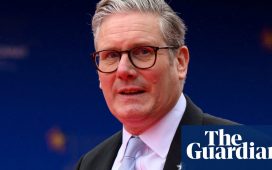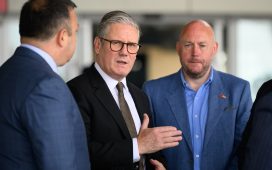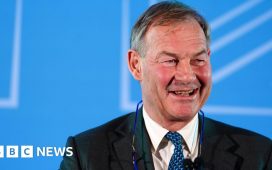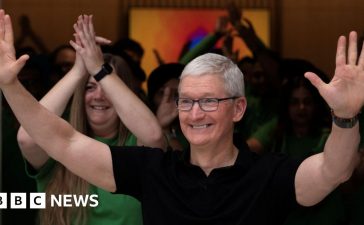UK will not rush to regulate AI, says Sunak
Rishi Sunak said that the government would not “rush to regulate” AI.
He said that states should not rely on private companies “marking their own homework, as many of those working on this would themselves agree, not least because only governments can properly assess the risks of national security”.
He continued:
And only nation states have the power and legitimacy to keep their people safe.
The UK’s answer is not to rush to regulate. This is a point of principle.
We believe in innovation. It’s a hallmark of the British economy, so we will always have a presumption to encourage it, not to stifle it.
And in any case, how can we write laws that make sense for something that we don’t yet fully understand?
Key events

Matthew Weaver
The shadow chancellor, Rachel Reeves, has been accused of apparent plagiarism in her new book about female economists.
An examination by the Financial Times of the book, The Women Who Made Modern Economics, found more than 20 examples of passages from other sources that appear to be either lifted wholesale, or reworked with minor changes, without acknowledgment.
The examples cited by the paper include an obituary from the Guardian, several Wikipedia entries and a passage from a fellow Labour frontbencher.
The book’s publishers, Basic Books, admitted that sentences in the book were not properly referenced. Reeves’s office denied plagiarism but acknowledged that errors were made and said they would be corrected.
A spokesperson told the FT:
We strongly refute the accusation that has been put to us by this newspaper. These were inadvertent mistakes and will be rectified in future reprints.
Basic Books pointed out that the book includes a bibliography from more than 200 sources. It told the FT:
Where facts are taken from multiple sources, no author would be expected to reference each and every one.
Read the full story here:
Rishi Sunak visited the Moorfields Eye Hospital in central London ahead of his speech on AI.
He was shown a retinal scan procedure, which makes use of the new technology, by Dr Siegfried Wagner and Dr Xiao Liu.


Peter Kyle, the shadow science secretary, has urged Rishi Sunak to “back up his words” following his speech addressing the “dangers and fears” around artificial intelligence.
He told Sky News:
Artificial intelligence is already having huge benefits for Britain, and the potential of this next generation of AI could be endless, but it poses risks as well.
Safety must come first to prevent this technology getting out of control.
Rishi Sunak should back up his words with action and publish the next steps on how we can ensure the public is protected.
We are still yet to see concrete proposals on how the government is going to regulate the most powerful AI models.
A Labour government would set clear standards for AI safety, so that this leading tech can be used to restore our public services and boost growth.

Aubrey Allegretti
UK government ministers are to hold an emergency committee meeting as work intensifies to secure “pauses” in the conflict between Israel and Hamas after a tank raid of Gaza.
Oliver Dowden, the deputy prime minister, said he would chair a Cobra meeting with figures from the Foreign Office, Ministry of Defence and Cabinet Office on Thursday morning.
He said there had been “some success” in delivering aid to civilians in Gaza who were lacking food, water or medicines, but that international negotiations were continuing, to try to reach those still in need.
The UK was pushing for specific pauses in fighting, which would be time and location specific to allow aid agencies to deliver items such as water filters and medical kits, he said. Britain has resisted calls for a total ceasefire.
Dowden told BBC Radio 4’s Today programme:
The reason why we don’t support a wider ceasefire is one just has to understand the position of people in Israel. If it had been the case in the UK that a group of terrorists had entered and indiscriminately sought to murder over 1,000 people, there would be demands that we remove this threat.
And it is perfectly legitimate for the Israeli government, in exercise of its self-defence, to remove the threat to its people, whilst, of course, respecting international law, as we have made the case to the Israelis and to others.
The humanitarian situation in Gaza is increasingly dire. A Red Cross mission has described scenes of chaos and exhaustion in the face of the total blockade by Israel, a critical fuel shortage and relentless bombing.
Read the full story here:
Boris Johnson’s pandemic-era chief adviser Dominic Cummings will give evidence to the Covid inquiry next week, alongside other senior officials from Number 10 during that period.
The inquiry confirmed that Cummings will appear on October 31, PA News reports.
Martin Reynolds, the former principal private secretary to Johnson when he was prime minister, will give evidence on October 30, as will former Number 10 director of communications Lee Cain.
Sunak unclear if China will accept his invitation to UK AI summit
Engaging with China on artificial intelligence may not be successful, the prime minister has admitted.
Rishi Sunak, speaking during a Q&A about the UK’s decision to invite Beijing to its AI safety summit, said:
I can’t say with 100% certainty that China will be there.
But I do believe that it is absolutely the right thing to have invited them.
China is unquestionably the world’s second AI power behind the US. That is just a fact when you look at the amount of research investment and activity that is happening there.
He added:
That doesn’t mean that it is going to be successful, it doesn’t mean you’re going to agree on everything.
But you should certainly try and engage with them because for a proper solution to AI over time, it is going to require an international solution. Whether China attends is obviously up to them.
Rishi Sunak said byelections are “always difficult for incumbent governments”, adding he was “confident” his government could lower taxes after inflation was “brought down”.
Answering a question about a prospective byelection in Peter Bone’s Wellingborough seat, the prime minister said after his AI speech:
I think there is lots of things in byelections which are always difficult for incumbent governments – I talked about that the other week, and we are just going to carry on delivering for the country.
When it comes to taxes, I’ve always been clear that of course I want to cut people’s taxes – I’m a Conservative, I believe in doing that.
But the priority when I became prime minister, it was to bring inflation down. And as I said then, the biggest tax cut we can deliver for the country is to halve inflation because it is inflation that makes people poorer, pushes up the prices of things, eats into your savings.
And that is very much following in the tradition of Margaret Thatcher and Nigel Lawson, and I believe that is the right economic policy.
And as I said, as we bring inflation down, then is the time to look forward and of course I want to deliver a lower tax economy for the country.
And I’m confident that we will, but first we have to make sure that inflation is brought down.
Prime minister Rishi Sunak said the world looks to the UK as providing an example on issues such as technology regulation.
He told reporters:
We as a country tend to get this right.
We tend to take a principles-based, proportionate approach to regulation that protects the things that we need to protect, whilst allowing the maximum amount of innovation to happen here.
That is the hallmark of the UK.
The UK cannot “put our heads in the sand” when it comes to the risks posed by AI, Rishi Sunak said.
Taking questions after his speech, the prime minister said:
We already invest far more in AI safety research than any other country in the world, that is what our taskforce … is doing.
There is debate about whether these risks will manifest at all and indeed over what timeframe, and you can see that debate in the community of AI experts and researchers.
But my view is that even if there is uncertainty, the risk could be potentially significant, so it is right that we take all the steps necessary to protect people and keep them safe, and that is what we will continue to do.
He said the new institute and next week’s safety summit was an example of how he wanted to keep the public safe.
Sunak continued:
What we can’t do is just put our heads in the sand and think this can either be ignored or will stop happening.
It is not going to stop – AI doesn’t respect borders, so what the right approach is for us is to be ahead of it in developing the expertise and capabilities to understand the risks and then mitigate against them.
Rishi Sunak said it was too simplistic to say artificial intelligence would “automate and take people’s jobs”, but admitted that all new technologies have an impact on the labour market.
Taking questions after his speech in London, he said:
I think also it’s important to recognise that AI doesn’t just automate and take people’s jobs.
A better way to think about it is as a co-pilot,” he said, giving an example of welfare case workers using AI to help them in their day-to-day tasks.
As with all technologies, they change our labour market. I think over time of course they make our economy more prosperous, more productive.
They create more growth overall but it does mean that there are changes in the labour market.
He said that the best thing the government can do is offer a “world-class education”, which Sunak said he was aiming to achieve.
It’s hard to predict the exact evolution of everyone’s job, and what we can do in government is make sure that we have a world-class education system.
That is the best way that I can ensure that everyone in our country benefits from not just AI, but everything that comes our way.











